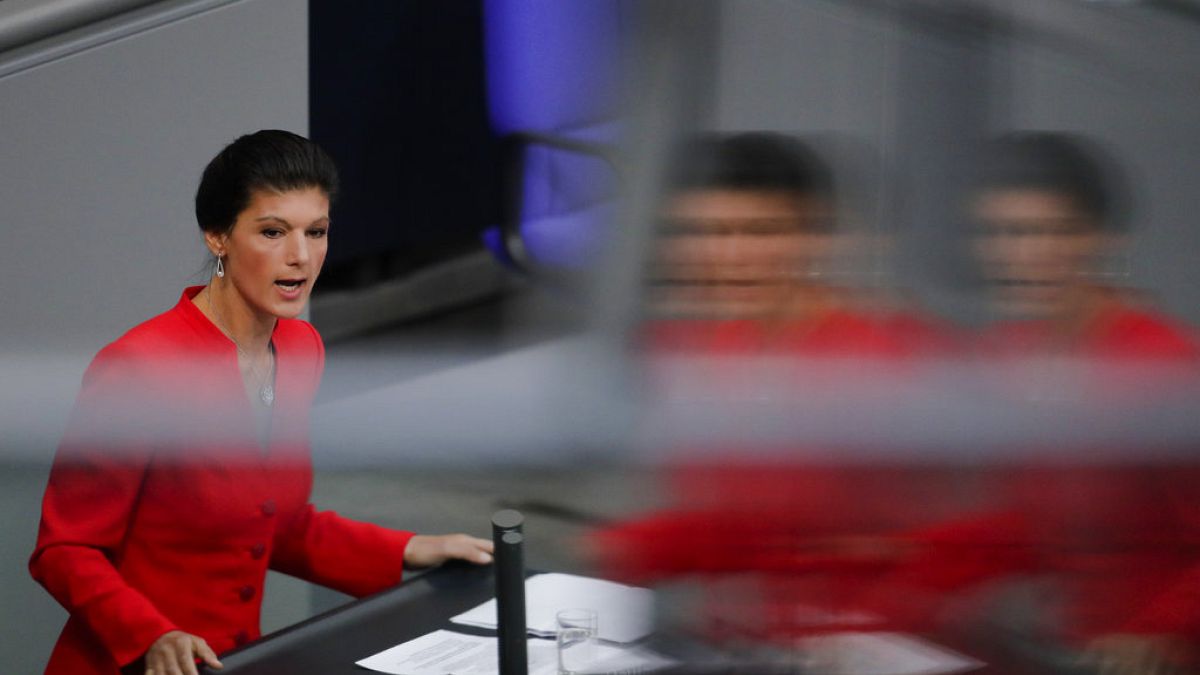Leftist fractions and parties from across the EU are ready to join forces in a new parliament group to compete with the far right on appeasement with Russia, working-class rights and migration, Euronews Super Poll reports.
The Euronews Super Poll projections on the makeup of the next European Parliament after the June elections unveil an increasing political fluidity among parties and alliances.
Some of the current groups will hardly survive the overwhelming conservative wave that is to run over the parliament’s hemicycle.
New parliamentary groupings are expected to be crafted according to the most recent political orientations of the union’s voters, political tactics and power games.
One of these is a populist and sovereignist left group envisioned by the German former leader of Die Linke, Sahra Wagenknecht. Preliminary talks with other parties of similar ilk across the EU are imminent.
The operational goal of the “red sovereignists” is to snatch populist votes from the far right, while its strategic purpose is to challenge the traditional EU centrist-liberal-democratic establishment on their ideological turf.
On 9 June, the EU citizens will cast their votes in a climate of deep anxiety for their future — one of the main reasons behind the expected dramatic growth of the conservative forces that promise protection against economic distress, migration and the threat of total war.
Yet, these issues don’t belong strictly to the conservative parties’ political heritage, as Boyd Wagner from the Euronews Polls Centre explained:
“The current make-up of everything leading into this election right now is in a bit in flux. And I think one of the things that is in flux is the populist left, because there are a lot of trends and a lot of shades in this ideology that correspond with some of the right in Europe right now,” Wagner said.
‘Wagenknecht effect’
According to the Euronews Polls Centre analysts, actual political conditions are in place for the creation of a new dissenting group of left nationalists and populists draining seats from three of the current blocs in the European Parliament: the S&D, the Left and the non-attached.
The leading political vector of this new group could come from the German radical left icon Wagenknecht, who is attempting to snatch populist consensus from the far-right Alternative for Germany (AfD).
The common rallying call of the populist and nationalist left parties is, in short, “our country’s destitute people first,” Wagner told Euronews.
“We need to make sure we’re focused on our workers, we assert that we’re focused on making sure that people have, liveable wages. And this comes down to the negotiations that are going to take place afterwards,” Wagner said, outlining the narrative.
A shared leftist security agenda?
According to the Euronews Superpoll analysts, despite their different views on some issues, the potential allies among the populist and nationalist left could find common ground in tackling the continent’s economic distress by blocking the Green Deal, stopping the war in Europe’s east by pushing for a foreign policy of appeasement with Russia, slowing down the migration that has been blamed for a spike in unemployment and low wages among the domestic working classes.
This means that the bloc would represent an antagonistic left group whose main mission would be to challenge the liberal-democratic and “open-society” mainstream parties of the centre-left and centre-right.
According to the Euronews Pollsters, the potential allies in Brussels and Strasbourg hemicycles of Wagenknecht’s BSW could be found among the Italian 5 Stars Movement (M5S) led by the former Prime Minister Giuseppe Conte, the Slovakian populists centre-leftists of prime minister Robert Fico and his SMER (Direction) party, and Slovakian democratic-left party led by President Peter Pellegrini, Hlas (Voice).
For some, negotiating an alliance might not take too long. For example, Fico’s party was suspended by their former group, S&D, and is currently part of the non-attached.
The pro-Russian and anti-migration Slovaks of SMER could bring four seats. The Workers Party of Belgium (PTB/PVDA) could contribute another three MEPs, jumping on the bandwagon from The Left.
Italy’s 5 Stars Movement staunchly supports a cease-fire in Ukraine and tirelessly opposes the “free marketeer” EU economic policies. Beppe Grillo’s former party is currently sitting on the benches among the rest of the non-attached.
An appeasement policy with Russia and the sovereignist agenda of the new group could attract Jean-Luc Melanchon’s LFI (France Unbowed), although the party is not anti-migration and has strong pro-environment ideas.
Other movements from across the EU could follow Wagenknecht’s experiment, such as Bulgaria, Portugal, Greece and the Baltics, where Russian minority communities have their own parties.
“How much can someone like Sarha Wagenknecht push parties in her direction and say, ‘listen, we’re going to have disagreements on these specific issues, but there are these other issues where we align that we think are most important for us moving forward,’ that’s what becomes a negotiating tactic at that point,” Wagner concluded.

